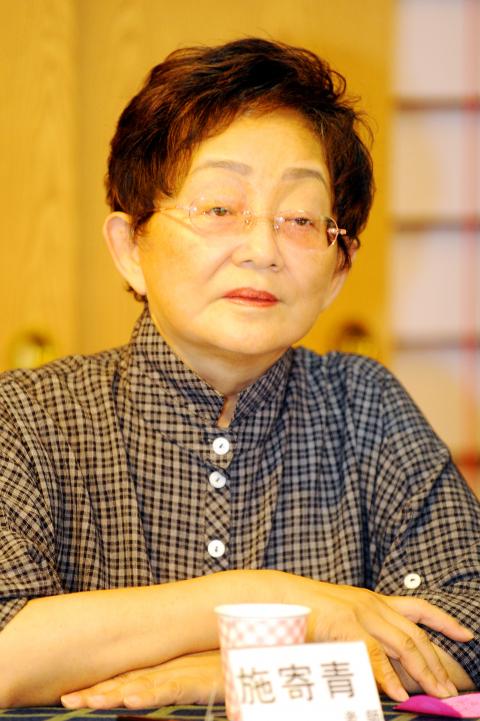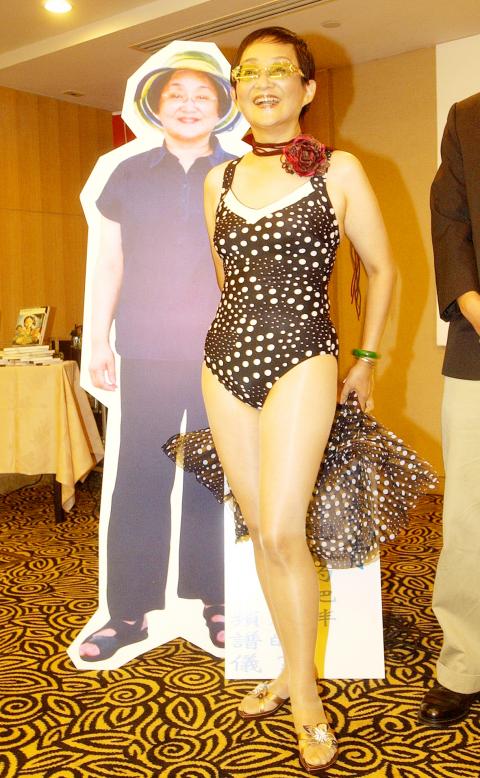Taiwan in Time: Jan. 9 to Jan. 16
It was a long shot, but Taiwan could have had its first female president as early as 1996. As the country prepared to hold its first direct presidential election, writer and women’s rights activist Shih Chi-ching (施寄青) put her name in the hat with another female, Wu Yue-chen (吳月珍), as her vice president.
When her application was denied because she didn’t meet the required number of election endorsements, Shih repeatedly protested to the Executive Yuan and finally took the case to the Council of Grand Justices.

Photo: Tsung Chang-chin, Taipei Times
She argued that along with the NT$1 million endorsement deposit and the NT$15 million election deposit, such restrictive measures were against the people’s constitutional right to run for public office, and were unfair to independent candidates who did not have party backing. She added that such measures favor the wealthy and “limits those who have been fighting for women’s rights for decades and truly want to serve the people and be the voice of the disadvantaged.”
“This only strips the rights of people from disadvantaged groups who want to run for office,” she added. Her case was rejected.
Political aspirations aside, Shih was quite an outspoken and often controversial figure, once stating that she had been a male fighter of justice in all her past lives, and only ended up as a woman in this life.

Photo: Wei Chia-chih, Taipei Times
Even at age 60, she appeared in a swimsuit to promote her book Challenging Venus (挑戰維納斯), detailing how she was able to lose 17kg without harming her body.
But of course, dieting was not the main subject of any of her previous books. Instead of challenging Venus, she began her career by challenging the patriarchy.
Following her divorce, she formed the Warm Life Association for Women in 1988 (晚晴協會) to help other divorced women. A year later she published her first book, Having Been Married (走過婚姻), which tackled a sensitive subject at a time when Taiwan’s divorce rate was beginning its rapid increase.
“I’m among the first generation of women who escaped the shackles of childbirth, were widely educated and, most importantly, could support ourselves,” she writes in the introduction as her rationale for publishing the book.
“Therefore, we are the first generation that can make our own decisions on our emotions and bodies. The experiences of our mothers and grandmothers are not applicable to us,” Shih writes.
Obviously the book made her a target for criticism, as she writes in the introduction of her next book Marriage Terminator (婚姻終結者).
“Many people seem to think that Taiwan’s increasing divorce rate is because of people like Shih Chi-ching declaring that women should be independent and leave the family.”
Such was Taiwan’s social climate back then. While Shih denies that she encouraged people to get divorced, she hoped to promote healthy views on the issue since divorce was becoming more prevalent.
“People are often unable to see this issue from a pragmatic and balanced angle,” she writes. “Divorcees like me are often misunderstood and rarely acknowledged.”
Some called her a monster, others called her a savior, and during this time she earned the moniker “Divorce Queen (離婚教主).”
She continues in the book that while society thinks it’s reasonable to oppose the Chinese Nationalist Party’s (KMT) 40-year dictatorship, they don’t feel the same about women challenging the several-thousand year patriarchy.
“The equality and democracy they know only applies to politics and men, and women are excluded from the conversation,” she writes.
Written in 1993, this sentiment probably foreshadowed her bid for the presidency three years later.
She later published two books on gender equality aimed at teenagers, but most of her later work focused on the occult, featuring psychics and past lives — including her final book, which is a supernatural autobiography published posthumously after she died on Jan. 13, 2015.
Taiwan in Time, a column about Taiwan’s history that is published every Sunday, spotlights important or interesting events around the nation that have anniversaries this week.

In the March 9 edition of the Taipei Times a piece by Ninon Godefroy ran with the headine “The quiet, gentle rhythm of Taiwan.” It started with the line “Taiwan is a small, humble place. There is no Eiffel Tower, no pyramids — no singular attraction that draws the world’s attention.” I laughed out loud at that. This was out of no disrespect for the author or the piece, which made some interesting analogies and good points about how both Din Tai Fung’s and Taiwan Semiconductor Manufacturing Co’s (TSMC, 台積電) meticulous attention to detail and quality are not quite up to

April 21 to April 27 Hsieh Er’s (謝娥) political fortunes were rising fast after she got out of jail and joined the Chinese Nationalist Party (KMT) in December 1945. Not only did she hold key positions in various committees, she was elected the only woman on the Taipei City Council and headed to Nanjing in 1946 as the sole Taiwanese female representative to the National Constituent Assembly. With the support of first lady Soong May-ling (宋美齡), she started the Taipei Women’s Association and Taiwan Provincial Women’s Association, where she

It is one of the more remarkable facts of Taiwan history that it was never occupied or claimed by any of the numerous kingdoms of southern China — Han or otherwise — that lay just across the water from it. None of their brilliant ministers ever discovered that Taiwan was a “core interest” of the state whose annexation was “inevitable.” As Paul Kua notes in an excellent monograph laying out how the Portuguese gave Taiwan the name “Formosa,” the first Europeans to express an interest in occupying Taiwan were the Spanish. Tonio Andrade in his seminal work, How Taiwan Became Chinese,

Mongolian influencer Anudari Daarya looks effortlessly glamorous and carefree in her social media posts — but the classically trained pianist’s road to acceptance as a transgender artist has been anything but easy. She is one of a growing number of Mongolian LGBTQ youth challenging stereotypes and fighting for acceptance through media representation in the socially conservative country. LGBTQ Mongolians often hide their identities from their employers and colleagues for fear of discrimination, with a survey by the non-profit LGBT Centre Mongolia showing that only 20 percent of people felt comfortable coming out at work. Daarya, 25, said she has faced discrimination since she